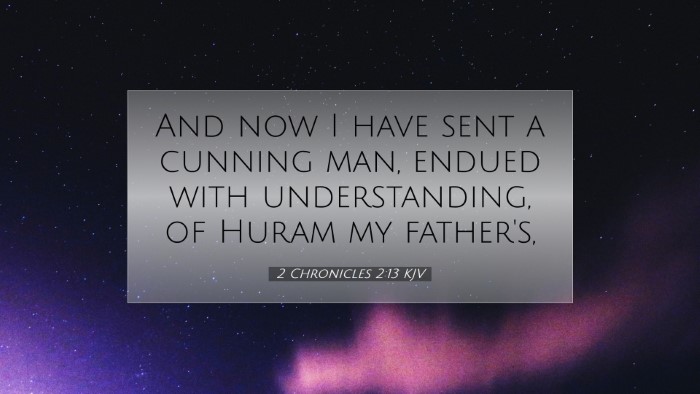Commentary on 2 Chronicles 2:13
Verse: 2 Chronicles 2:13 (KJV) - "And now I have sent a cunning man, endued with understanding, of Huram my father's, the son of a woman of the daughters of Dan, and his father was a man of Tyre, a worker in brass."
Introduction
The verse under consideration presents a significant moment in the preparations for the construction of the Temple in Jerusalem, as initiated by King Solomon. The mention of Huram, a skilled craftsman from Tyre, underscores the importance of both human skill and divine favor in the undertaking of holy tasks, a theme echoed throughout the Scriptures.
Insights from Public Domain Commentaries
Matthew Henry's Commentary
Matthew Henry notes the importance of craftsmanship in the building of God's house. He emphasizes that Solomon sought a "cunning man," denoting not merely skill, but a profound understanding of the art of craftsmanship. This choice indicates Solomon's awareness that physical structures require adept hands and wise minds, particularly when representing divine presence.
Henry further explains that Huram, hailing from Tyre and being of mixed heritage – a Jewish mother from the tribe of Dan and a father from Tyre – signifies the amalgamation of various gifts and backgrounds in God's work. This reflects God’s ability to utilize diverse talents for His glory, exemplifying inclusivity in the work of the Lord.
Albert Barnes' Notes on the Bible
Albert Barnes emphasizes the precision of words used to describe Huram. The term "cunning man" conveys a sense of exceptional dexterity and intellectual capability. Barnes highlights that this was not merely a crafting role; it encompassed architectural understanding, as well. Solomon recognized that such an important task, the construction of the Temple, required a man whose skills encompassed both artistry and structural integrity.
Barnes also relates this passage to the broader context of God's providence, noting how God equips His servants with necessary abilities and resources. This reflects the New Testament principle where believers are called to use their God-given talents for the work of the Kingdom.
Adam Clarke's Commentary
Adam Clarke provides additional context regarding the historical and cultural background of Tyre’s craftsmen. He informs readers that Tyre was renowned for its artisans, particularly in metalwork. Clarke points out that Solomon’s choice of Huram was strategic, as it allowed for the importation of superior skills that would otherwise be unavailable in Israel.
Clarke also points to the spiritual implications of choosing Huram, suggesting that Solomon’s collaboration with a man from Tyre illustrates the broader theme of unity in diversity within God's plan. He reflects on how God’s purposes can transcend national and ethnic boundaries, as seen in the Old Testament foreshadowing the inclusion of the Gentiles in the New Testament era.
Theological Implications
The rich insights derived from these commentaries emphasize God's role in preparing His house. The verse teaches that God's work in the world often involves cooperative efforts among individuals with varied backgrounds and gifts. This serves as a reminder to today’s believers – that God equips all people for service in His kingdom, whether through innate talents, wisdom, or acquired skills.
Furthermore, the involvement of non-Israelite craftsmen in the construction of the Temple can be viewed as an expression of God's universal sovereignty and mercy. Just as Huram's skills were integral to facilitating the worship of God, so too are the diverse gifts within the body of Christ essential for fulfilling the Great Commission.
Conclusion
In conclusion, 2 Chronicles 2:13 offers profound lessons for pastors, students, theologians, and Bible scholars. The interaction between Solomon and Huram illustrates the significance of expertise and craftsmanship in God's work. It acts as a reminder that God directs hearts and circumstances to fulfill His divine purposes. As ministers and servants of the gospel, believers are encouraged to recognize and utilize the diverse gifts and talents God has bestowed upon them for His glory.


